- Home
- >
- News
- >
- Company News
- >
- View Details
Frontier Focus | KASP technology helps wheat rust resistance breeding: from genotyping to precision breeding
23-04-2025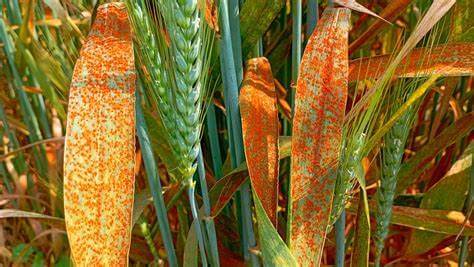
Wheat rust, caused by the fungus Puccinia, is one of the most serious diseases in global wheat production. It includes leaf rust, stripe rust and stem rust, which cause a large amount of wheat production loss every year. With climate change and the continuous emergence of new strains of pathogens, the prevention and control of rust faces huge challenges. Although traditional breeding methods have made some progress, they are difficult to meet the needs of rapid response to new strains. Therefore, using modern molecular biology technology to accelerate the selection and breeding of rust-resistant varieties has become an important direction of agricultural research.
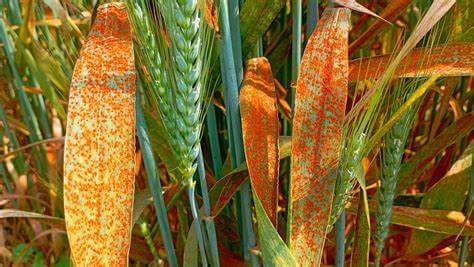
KASP technology: opening a new chapter in wheat rust resistance breeding
KASP (Kompetitive Allele-Specific PCR) technology, as a high-throughput, high-precision genotyping technology, has shown great potential in wheat rust resistance breeding in recent years. This technology can quickly detect single nucleotide polymorphisms (SNPs) through specific primers and fluorescent probes, providing a powerful tool for the location, identification and screening of rust resistance genes.
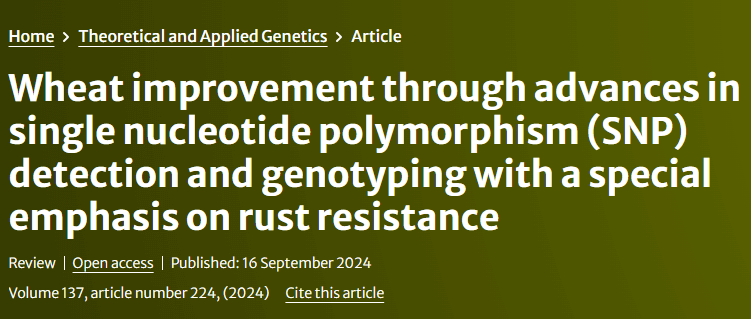
In September 2024, the internationally renowned journal "Theoretical and Applied Genetics" published a review article entitled "Wheat improvement through advances in single nucleotide polymorphism (SNP) detection and genotyping with a special emphasis on rust resistance", which systematically summarized the application progress of KASP technology in wheat rust resistance breeding.
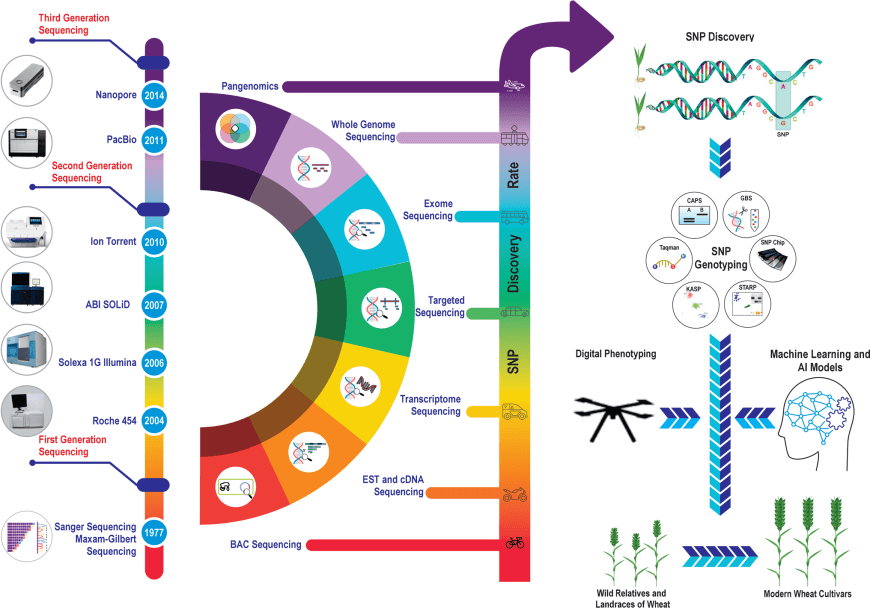
The top picture shows the development of sequencing technology, the middle picture shows various resources for SNP discovery, and the right picture outlines the role of SNP in crop improvement.
Many research teams around the world have used KASP technology to perform genotyping on multiple wheat varieties and successfully located multiple QTL loci associated with stripe rust resistance. Through marker-assisted selection, breeders have screened out a number of varieties with excellent resistance in a short period of time, significantly improving the disease resistance of wheat.
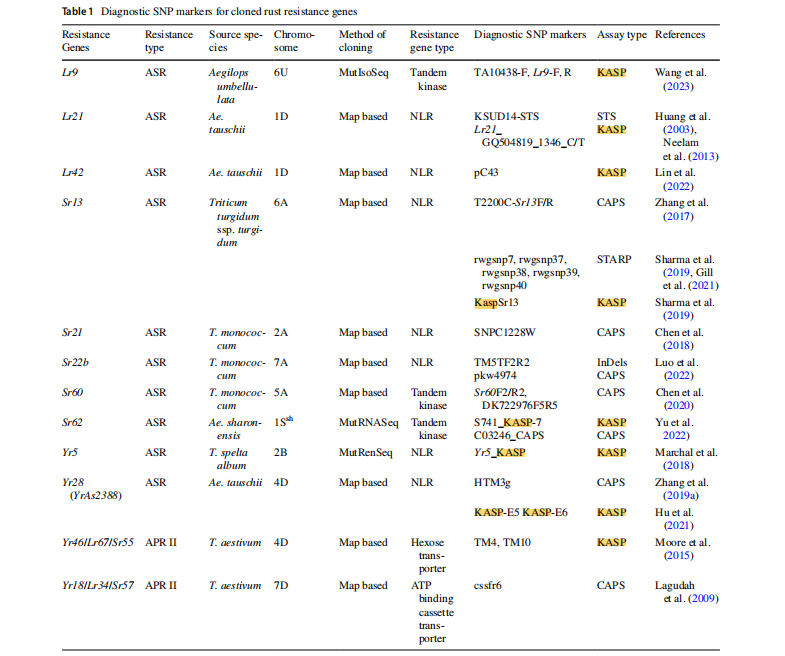
Diagnostic SNP markers for cloned rust resistance genes
Experimental process of KASP technology in wheat rust resistance research
1. Experimental objectives
Objective: Use KASP technology to detect single nucleotide polymorphism (SNP) sites associated with wheat rust resistance and accelerate the breeding of rust-resistant wheat varieties through marker-assisted selection (MAS).
2. Experimental materials
Sample collection: Select wheat samples containing rust-resistant and rust-susceptible varieties, including modern cultivated varieties, wild relatives, and materials with specific resistance traits.
DNA extraction: Extract high-quality genomic DNA from wheat leaves or other tissues for subsequent KASP detection.
3. KASP primer design
SNP site selection: Based on previous genomic studies or literature reports, select known SNP sites associated with rust resistance.
Primer design: Design specific KASP primer pairs based on the selected SNP sites. Each primer pair includes two allele-specific primers and a universal reverse primer. Primer design must ensure specificity and high amplification efficiency.
4. KASP reaction system configuration, PCR fluorescence detection and data analysis
Fluorescence signal detection: Use a fluorescence detection system (such as a real-time PCR instrument or a fluorescence imaging system) to read the fluorescence signal in the reaction system.
Data analysis: Determine the genotype of the sample based on the intensity and pattern of the fluorescence signal. The analysis software can automatically identify the allele type and generate a genotype report.
5. Marker-assisted selection (MAS)
Resistance gene screening: Screen out plants carrying rust resistance genes based on the KASP test results.
Breeding application: The selected excellent plants are used for subsequent hybridization or self-pollination breeding to accelerate the selection of rust-resistant wheat varieties.
6. Verification and application
Field trial verification: The rust-resistant plants screened by KASP are planted in the field to verify their disease resistance and agronomic traits.
Multi-environment testing: Multi-point tests are carried out in different ecological environments to uate the stability and adaptability of rust resistance genes.
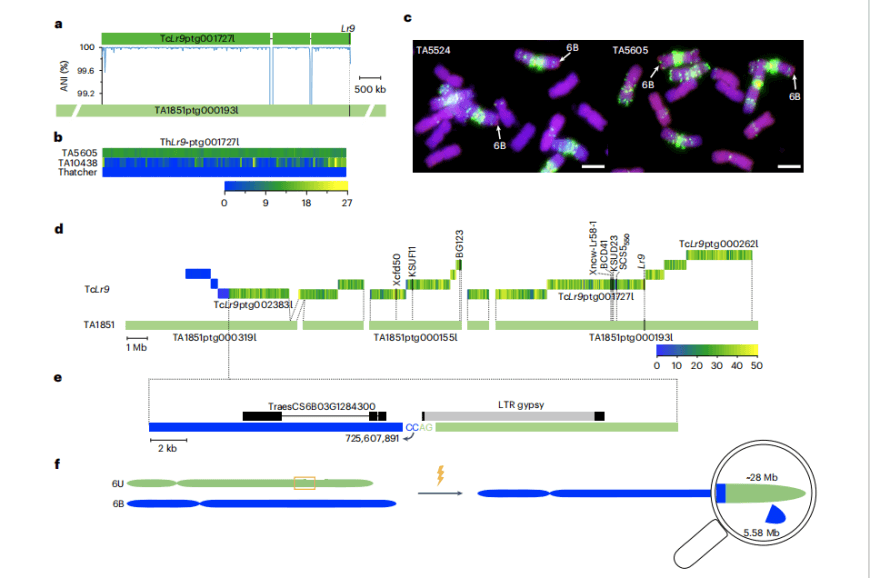
Assembly of Lr9 gene and KASP marker verification. (Yajun Wang et al. Nature Genetics, 2023)
Highlights of KASP technology in wheat rust resistance breeding
Efficient genotyping and resistance gene localization
KASP technology can quickly and accurately detect SNP sites associated with rust resistance. Through large-scale genotyping, researchers can accurately locate the location of rust resistance genes on wheat chromosomes, laying the foundation for subsequent gene cloning and functional verification.
Marker-assisted selection (MAS) accelerates breeding process
Traditional breeding methods rely on phenotypic screening, which has a long cycle and low efficiency. KASP technology combined with marker-assisted selection (MAS) enables breeders to quickly screen out plants carrying rust resistance genes at the seedling stage, significantly shortening the breeding cycle.
Multi-environment verification and gene stability analysis
KASP technology can not only detect SNP sites, but also combine multi-environment tests to verify the stability of rust resistance genes under different ecological conditions. This is of great significance for the selection of widely adaptable rust-resistant varieties
Dongsheng Bio KASP PCR MIX: a powerful tool to assist scientific research and breeding
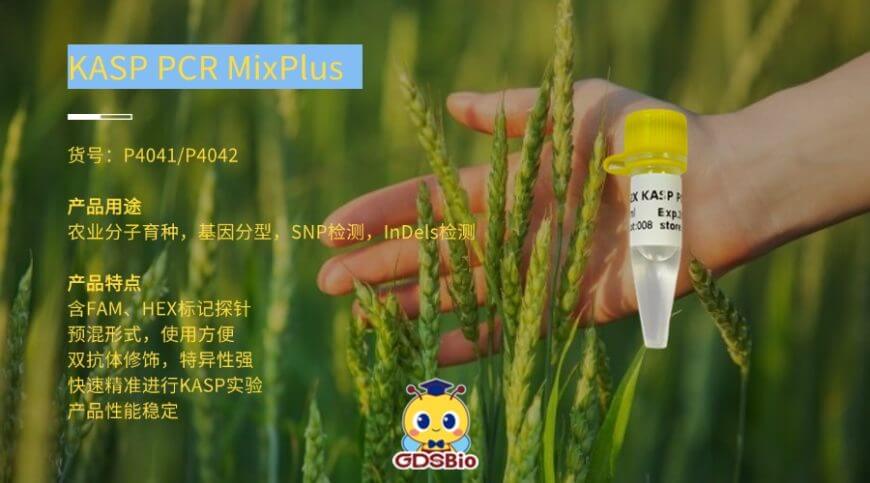
Get the latest price? We'll respond as soon as possible(within 12 hours)
